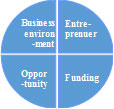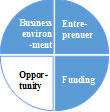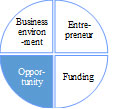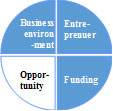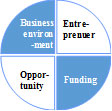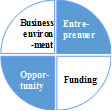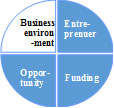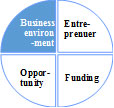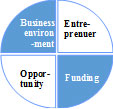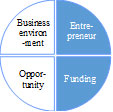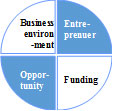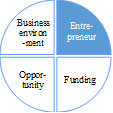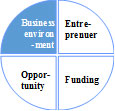JETRO Global Connection -Accelerate Innovation with Japan-
Report
Has the Startup Ecosystem in Japan Formed?
Japan's strengths and weaknesses compared to major countries
(Japan)
October 15, 2019

Japan is said to be in the midst of the fourth venture boom. It is said that there are currently more than 10,000 startups (Note 1), and the system to support entrepreneurs has been enhanced. The following is an explanation of the current state of the Japanese ecosystem, which has become visible compared to other countries.
Tokyo, Driving Japan’s Ecosystem
The startup ecosystem (see Figure 1) that originated in the United States Silicon Valley is formed by accidental or inevitable overlapping of various factors, such as entrepreneurs, funds, surrounding corporations, and laws and regulations. The ecosystem continuously creates startups that excel in business innovation and pursuit of innovation, and has the function of promoting creative destruction among corporations.
Figure 1: Concept of ecosystem
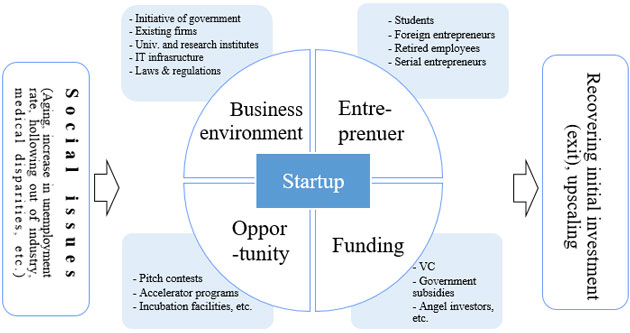
Source: Created by JETRO based on various information
At present, ecosystems have been formed around the world, and there are various characteristics in various places (see Table 1). For example, in Paris, France and London, UK, since the 1990s, industries have been hollowed out due to the relocation of manufacturing bases to neighboring countries, and there has been an increase in the promotion of innovation to foster future industries, leading to the formation of ecosystems centered around research and development and cooperation between industry, academia and government. Asian economies also have distinctive ecosystems, such as an increasing number of startups in the e-commerce and transportation services sectors, which help solve social issues such as inadequate infrastructure, excessive population density and high unemployment.
Even in Japan, recognition of the need for an ecosystem has finally increased, and the startup support system has been strengthened. In the "Global Startup Ecosystem Report 2019![]() " (from Startup Genome LLC), Japan was first mentioned in 2019 as the stage when Tokyo began to promote global collaboration on ecosystems, that is, the Early-Globalization Phase Ecosystem. Adv. Manufacturing & Robotics and Fintech are introduced as areas of strength. It also mentions the Tokyo Metropolitan Government's accelerator program FinTech Business Camp Tokyo where non-Japanese companies can also participate and the startup company development support program J-Startup
" (from Startup Genome LLC), Japan was first mentioned in 2019 as the stage when Tokyo began to promote global collaboration on ecosystems, that is, the Early-Globalization Phase Ecosystem. Adv. Manufacturing & Robotics and Fintech are introduced as areas of strength. It also mentions the Tokyo Metropolitan Government's accelerator program FinTech Business Camp Tokyo where non-Japanese companies can also participate and the startup company development support program J-Startup![]() , promoted by the Ministry of Economy, Trade and Industry. You can say that Japan's efforts have been positively received outside Japan as well.
, promoted by the Ministry of Economy, Trade and Industry. You can say that Japan's efforts have been positively received outside Japan as well.
| City | Advantages |
|---|---|
| Silicon Valley |
|
| Boston |
|
| Helsinki |
|
| London |
|
| Paris |
|
| Berlin |
|
| Tel Aviv |
|
| Dubai |
|
| Singapore |
|
| Shanghai |
|
| Shenzen |
|
| Bangalore |
|
| Tokyo |
|
Note: 1) This list includes cities where "JETRO Global Acceleration Hubs," which assist Japanese startups in expanding business through overseas ecosystems, are located, plus Tokyo.
2) Blue colored quadrants indicate advantages.
Source: Created by JETRO based on various materials
Open Innovation of Large Corporations Promoting Japan's Ecosystem
One of the factors driving the fourth venture boom (Note 2) in Japan from around 2014 to the present is the growing momentum of open innovation in cooperation with startups. Large companies, which have been developing their own technologies and research and development (R&D) and focusing on affiliates, in order to respond to the rapid technological evolution and drastic changes in the market in recent years, have started to work outside their organization to respond. To create new businesses, the company has begun investing in and collaborating with startups that are aiming for business synergies, utilizing internal reserves and R&D budgets. Leading companies are launching corporate venture capital (CVC) one after another, and the number of investments by CVC in 2018 was 317, up 4.5 times from 2013 before the venture boom (per CB Insights). Startups are also looking to increase their creditworthiness by accepting investments from large companies, thus meeting the needs of both parties (see Table 2). For example, DENSO, a major auto parts maker, has formed a capital tie-up with FLOSFIA, a startup that arose from Kyoto University, involving Series C shares (Note 3). The two companies have agreed to proceed with joint development regarding the electrification of vehicles.
The search for startups with which large companies collaborate is not only limited to the domestic market, but is also searching for seeds of innovation overseas. Above all, there is a growing movement to bring in foreign companies with sharp technologies, such as startups with advanced cybersecurity technologies and startups from Asia with IoT (Internet of Things) related technologies. The Internet Initiative Japan (IIJ) has jointly developed a small and lightweight IoT gateway device with Taiwanese startup NextDrive. The device is expected to be used for various purposes such as home security, monitoring, and indoor environment management. “Japan has built good relations with Southeast Asia. By partnering with IIJ, which has already expanded into the region, we plan to develop into the global market.” said Shawn Shih, CEO of NextDrive Japan, who also emphasized the importance of alliances with Japanese companies (JETRO - Success Stories) (Japanese only). In addition, Fujitsu has selected a US startup, Quantstamp, for the Fujitsu Accelerator Program, which was launched in 2015 to develop new businesses that go beyond Fujitsu's existing business. They understood the technology's advanced nature and future importance of providing blockchain-based security services and supported the company's expansion into the Japanese market.
In addition, Fujitsu will participate in the Smart Contract Security Alliance, an international consortium established by Quantstamp in March 2019, and is showing a policy of working together to define security standards, of which blockchain security will be the key going forward.
| Company | Startup Location | Date | Details |
|---|---|---|---|
| Mitsui Fudosan | Tel Aviv, Israel | Jul-17 | Dronomy, a startup set up by drone researchers in the Israeli army, conducted an aerial photography at a construction site using autonomous flight technology. Usage of the tool as a tool for managing the progress of construction work, measuring and sharing information between stakeholders is being considered. |
| Toyota | Shenzhen, China | Aug-17 | Partnered with IngDan, a company that supports IoT device development. The company searched for a company that can jointly develop IoT devices for vehicles connected to the Internet, and aims to reduce the cost of products for China. |
| Internet Initiative Japan (IIJ) | Taiwan | Sep-17 | Developed IoT gateway device capable of acquiring smart meter data in collaboration with NextDrive, a Taiwanese startup that develops IoT solutions. |
| Sekisui Chemical | Illinois, USA | Dec-17 | Through joint development with bioventure LanzaTech, successfully established the world's first innovative production technology that converts waste into ethanol. |
| DENSO | Kyoto, Japan | Jan-18 | Started collaborative development with FLOSFIA, a venture from Kyoto University, for automotive applications of corundum-structured gallium oxide as a material for next-generation power semiconductors. |
| Tokyo Gas | Tokyo, Japan | Nov-18 | In addition to Furomimi, a voice service for bathing developed jointly with OTOBANK, which operates an audiobook distribution service, the company also provides voice content that supports people in doing things such as childcare and housework. |
| Fujitsu | Silicon Valley, USA | Mar-19 | Participated in an international consortium launched by Quantstamp to formulate security definitions, one of the challenges for blockchain technology. Looking for future business collaboration. |
The Next Challenge: Fostering Entrepreneurship and Internationality
Although the ecosystem in Japan is developing, centered on the open innovation of large companies, that alone is not enough to create sustainable startups. "Open innovation starting from me![]() (4MB)"(Japanese only) announced by the Cabinet Office states, "Innovative value creation involves not only methodologies such as launching a CVC derived from a company or establishing an accelerator program, but also intrinsic motivation, empathy, diversity, etc. are needed." The Global Entrepreneurial Monitor publishes the Total Early-Stage Entrepreneurial Activity Index (TEA) as an index to measure entrepreneurship in each country. The index shows the percentage of people who are actually preparing for starting business and who are under 3 and a half years after starting business per 100 adults. Compared to the United States (15.6) and Israel (12.7), which have substantial ecosystems, Japan was 5.3 at a lower level than other major countries (see Figure 2). The main reasons are the low status of entrepreneurs in society and the high-risk aversion.
(4MB)"(Japanese only) announced by the Cabinet Office states, "Innovative value creation involves not only methodologies such as launching a CVC derived from a company or establishing an accelerator program, but also intrinsic motivation, empathy, diversity, etc. are needed." The Global Entrepreneurial Monitor publishes the Total Early-Stage Entrepreneurial Activity Index (TEA) as an index to measure entrepreneurship in each country. The index shows the percentage of people who are actually preparing for starting business and who are under 3 and a half years after starting business per 100 adults. Compared to the United States (15.6) and Israel (12.7), which have substantial ecosystems, Japan was 5.3 at a lower level than other major countries (see Figure 2). The main reasons are the low status of entrepreneurs in society and the high-risk aversion.
Figure2: Total Early-Stage Entrepreneurial Activity Index in major countries
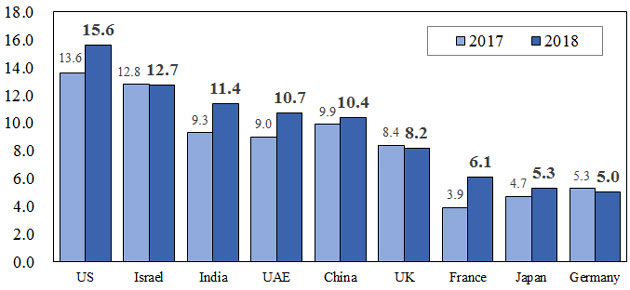
Note: Total Early-Stage Entrepreneurial Activity Index (TEA) is an index of the total number of people who are actually preparing for starting business and who are under 3 and a half years after starting business per 100 adults (aged 18-64).
Source: Global Entrepreneurship Monitor 2018/2019
Incorporating internationality into the ecosystem is also essential. Many successful startups are born global companies aiming for rapid growth. A born global company is a company that can start international business activities such as export, licensing, local production and R&D shortly after its establishment, and has a sustainable competitive advantage that could not be accumulated by the conventional internationalization process. (Ministry of Internal Affairs and Communications "White Paper on Information and Communications in Japan") Therefore, it is means that the market can be acquired both inside and outside Japan, and the lower the dependence of products and services on language and culture, the easier it is to succeed. A globally open ecosystem can increase scalability to global markets. In a globally recognized ecosystem, you can see the success of internationally-minded human resources. For example, approximately 40% (37.4%) of Silicon Valley's population is foreign-born. In the computer science field, that number hikes up to 66%. In the Nordic countries, Berlin, Germany, Shenzhen, China, Bengaluru, India, etc. foreigners and immigrant freelancers, and native entrepreneurs with experience studying or working overseas are playing important roles in those ecosystems.
In an interview with JETRO, a Japanese representative of a leading non-Japanese accelerator said, “In terms of scalability, Japanese startups are focusing too much on the domestic market at the growth stage and have not been able to adapt to overseas markets. They should focus on overseas market to prioritize what customers want. Made in Japan and Designed in Japan have brand value, especially in Asia, and in order to differentiate Japanese startups, they should be well branded.”
Note 1: Startups are companies and entrepreneurs with specific products or business model plans to raise funds and scale up in a short period of time, aiming to innovate with unique technologies, products and services and to bring new value to society. For the contents of this paper, see “JETRO Global Trade and Investment Report 2019![]() (2.1MB)”, pp. 63-74 (Japanese only).
(2.1MB)”, pp. 63-74 (Japanese only).
Note 2: The first venture boom was in the 1970s. Many manufacturing technology companies were born, and Japan's first private venture capital was born. The second is in the 1980s, with the shift from the manufacturing industry to an industrial structure centered on tertiary industries such as the service industry. The third is the 1990s. During the recession, growing global IT demand and active government support have spawned a number of startups. (Refer to JETRO "The Revitalized Startup Ecosystem and Japan’s Changing Business Scene![]() (696KB)"(Japanese only))
(696KB)"(Japanese only))
Note 3: Series C is generally the final round of investment funding, aiming at an IPO or M&A.
- Report by:
- IOKI Tomoko, International Economy Division, Overseas Research Department, JETRO
-
US<>Japan VC Playbook: Bridging U.S. and Japanese Startup Ecosystems

February 2026
-
Overview of Japanese Startup Investment for US Venture Capitalists

May 2025
-
TBM, a Japanese Unicorn, is taking its environmentally conscious materials and solutions global

April 2025
-
Algal Bio’s Plan to Scale-up Microalgae Solutions for Food, Health, Climate, and more

March 2025
-
From Complexity to Clarity: How Veritus Helps Professors and Research Labs Innovate 5X Faster

February 2025
-
Biodata bank: Innovating Heat Risk Solutions for a Warming World

February 2025
-
Thermalytica’s Improved, Nano-scale Insulation Technology Could Change the World

January 2025
-
Techstars Tokyo Demo Day shows how Japan is Making Strides Towards Becoming a Global Startup Hub

December 2024




